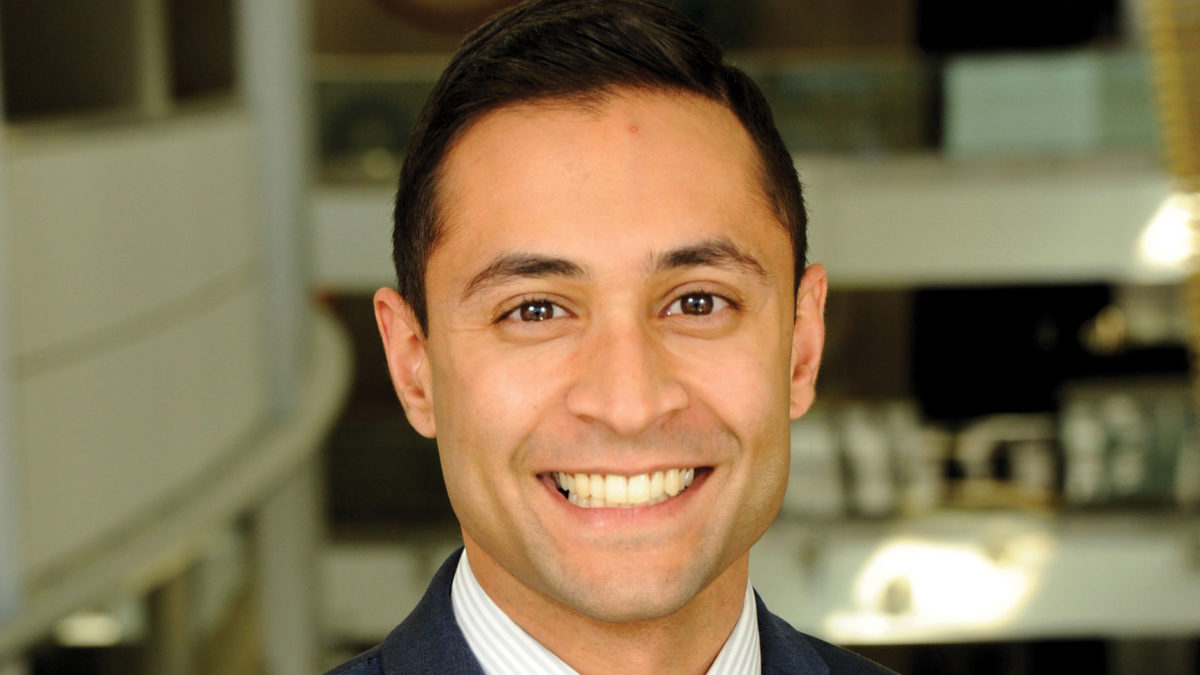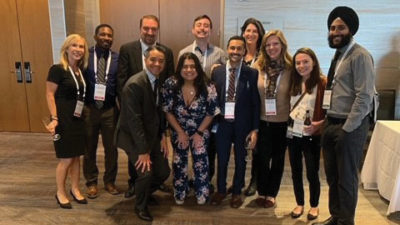
Anshul Bagga
Influencing Action, Implementing Policies, and Serving the Community
June 2022
Download This Article (.pdf)
For Anshul Bagga, a career in public service was a conscious choice point. It was a post-graduation pause during which he connected with his “why” before making a career decision, ensuring that any position he accepted aligned with his goals and values and was a place where his intellectually curious nature could thrive. That place ended up being the Denver City Attorney’s Office (CAO), where he advanced through a series of high-impact roles. In reflecting on his path of public service, Bagga remarks, “I think I was drawn to public service because I love the democratic process. I place a lot of value in representing the people of the City and County of Denver, and there’s something rewarding about knowing that the interests I represent and the positions I take were arrived at through compromise.”
Environmental Law Beginnings
A Colorado native and first-generation American whose parents both immigrated to the United States from India in 1983, Bagga received his BA in sociology from Colorado State University and his JD from the University of Colorado Law School. He began his career with the CAO in 2014 when Denver authorized the first legal sales of recreational marijuana and has been an influential guide within the agency since.
“Joining the CAO has undoubtedly allowed me the opportunity to work on innovative policies with a high degree of influence, especially with cannabis work. It’s always interesting reminiscing on when I attended CU Law because I was interested in pursuing a career in environmental law and went on to have several internships and positions in that setting. Some of my favorite roles include being a research assistant, which I did for two professors in law school, and working on the Acequia Assistance Project.” A joint effort by the Getches-Wilkinson Center, Colorado Open Lands, and the Sangre de Cristo Acequia Association, the Acequia Assistance Project assists rural farmers in the San Luis Valley in incorporating and preserving their water rights. “It was pretty cool to meet with irrigators in the San Luis Valley to discuss corporate organization options,” Bagga added.
During law school, Bagga worked for the Natural Resource Law Center researching and writing essays about water transfers and state water law, and as a research assistant for CU Law’s Professor William Boyd, drafting memos and analyzing a wide range of energy and environmental law topics.
A Fellowship as a Path to the Profession
Following time spent in environmental law settings, Bagga welcomed a fellowship position from the CAO. He drafted legal memos interpreting marijuana legislation for interagency use, counseled executives, and guided agency training on the subject. “I looked for fellowships that had opportunities for mentorship and collaboration across teams, and the CAO’s Prosecution and Code Enforcement (PACE) Section was just the place for that,” said Bagga. Joining the CAO in 2014 was certainly a unique time for the Denver city government as the first legal recreational sales began in Colorado. “This was an extraordinarily progressive time to be behind the scenes of local government. The collaborative work among several city agencies in designing a marijuana regulation program set Denver on a pathway of becoming a model as cannabis legalization eventually spread across the country.”
Following his fellowship, Bagga would eventually serve as an assistant director in the PACE Section, supervising five teams of attorneys, including the mental health team, neighborhood prosecution, the marijuana unit, excise and licensing, and real property nuisance abatement.
Much of Bagga’s work has been in cannabis regulation, helping to craft some of Denver’s earliest marijuana ordinances, including the regulation of marijuana extraction, unlicensed cultivation, consumption clubs, and pesticide regulation. “Working so closely with state and federal partners on a variety of emerging cannabis issues was a very illuminating experience. This partnership deepened my interest in the subject matter, and I eventually was selected to be on the steering committee of the Colorado Hemp Advancement and Management Plan.” Bagga would then serve as general counsel to the Department of Excise and Licenses, and oversee several related projects on behalf of the City and County of Denver.

Through his local government background and understanding of Denver’s unique and diverse demographics, Bagga leaned into the opportunity to serve as the city’s point of contact for all cannabis-related issues. He collaborated with colleagues across the CAO on a broad range of topics, including analyzing and providing feedback to state legislation, drafting ordinances, and responding to citizen complaints.
“When the Denver Department of Public Health and Environment (DDPHE) began regulating marijuana tainted with unapproved pesticides, the city was sued by a cultivator who claimed that Denver was acting outside of its authority. My team obtained the cooperation of an EPA witness, and the expert witness testified about pesticide regulation in the United States and the lack of approved cannabis uses. Recognizing the regulatory gap, a Denver District Court judge ultimately determined that DDPHE had the authority to regulate pesticide-contaminated marijuana. Denver’s leadership on the issue sparked state regulation of marijuana pesticide use.”
Turning Over a New Leaf
Since 2014, Denver has led the way in regulating marijuana legalization; however, thousands of people of color have been disproportionately impacted by low-level convictions that are no longer crimes in Colorado. As the demand for vacating low-level marijuana convictions swelled post-legalization, Bagga’s efforts with the CAO also supported Mayor Michael B. Hancock’s mission to promote equity in Denver through helping design the city’s “Turn Over a New Leaf” program. This strategic collaboration unified resources from the CAO, the Department of Excise and Licenses, and the Denver District Attorney’s Office into a single program to mitigate the adverse effects of low-level marijuana convictions obtained before legalization.
“Communities of color bear the brunt of the drug war’s decades-long social injustices. The primary goal of the program is to ensure equity for our racially marginalized communities and individuals impacted by low-level marijuana convictions by creating a pathway through which individuals can request that certain low-level marijuana convictions be vacated, and their case be dismissed and sealed.”
The harmful effects of the war on drugs continue for communities of color and historically marginalized groups. Even today, a low-level marijuana offense can damage many aspects of a person’s life, including employment, economic earning potential, educational opportunities, qualification for government benefits and programs, housing, and more.
“We recognized the need to have both online and in-person services, and with the help of many community partners, we were able to host a series of clinics throughout Denver to help people navigate the legal process. We are so appreciative of the many local businesses, organizations, city agencies, libraries, churches, and individuals and to all those in the community for helping to spread the word about the clinics and our city’s services.”
How Can We Do the Most Good?
When not serving as counsel for all cannabis-related issues and programming, Bagga worked in Denver’s Outreach Court, which serves as a multi-pronged approach to connecting those in need and vulnerable populations with appropriate services.
Held every other Wednesday, the Outreach Court docket primarily assists persons experiencing homelessness who have municipal warrants. It’s designed to “meet people where they are,” recognizing that persons experiencing homelessness face unique challenges in making it to the downtown courthouse to attend their court dates. “Denver’s suite of specialty courts, like Outreach Court, really demonstrate the City’s commitment to meet people where they are and tailor solutions to individual circumstances.”
As a result, this docket is currently housed at the Denver Public Library and Haven of Hope. The entire court, including the magistrate, public defender, PACE prosecutor, public service programmers, and mental health outreach staff, collaborate to resolve cases appropriately and to provide resources and services.
The city’s specialty dockets also include “Wellness Court,” which provides individuals with a bevy of resources and helps build a support community that most people in the system lack. Wellness connectors identify individuals with low-level offenses and behavioral health needs at the time of arrest and intake into the jail. They then conduct a brief assessment to determine the individual’s needs, after which they allow the individual to select up to six goals to connect the individual with much-needed resources. Goals may include, for example, obtaining photo identification, connecting with food resources, locating behavioral health resources, and connecting with empowerment or education services.

When Not on the Clock
When he’s away from the bustle of municipal government, Bagga enjoys bouldering, baking bread, traveling, and fishing the South Platte River and small alpine lakes. He can regularly be found in Waterton Canyon during the spring and summer months.
What’s Next?
In consultation with City Council leadership and after an internal and external search, Bagga accepted the CAO’s legislative counsel position and transitioned into this role in February 2022. In this role, Bagga will serve as a legal advisor for the Denver City Council and manage CAO’s legislative priorities, working closely with the mayor’s legislative director and other members of the mayor’s legislative affairs team.
“Being a legal advisor to Denver’s City Council is truly an honor,” Bagga said. “Above all else, I’m grateful to the CAO for allowing me to work alongside some of the most experienced and intelligent attorneys in the country. I very much look forward to continuing to represent one of Colorado’s most respected municipal legislatures.” 


